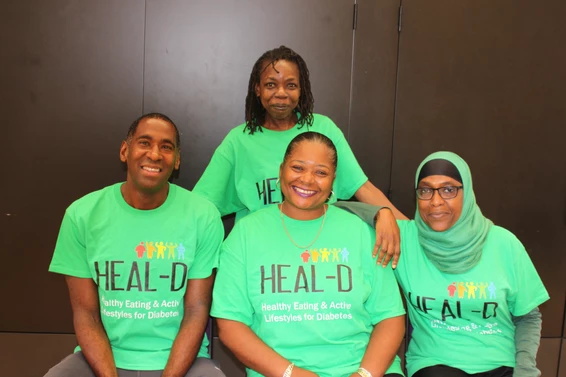Find Out More
For more information about HEAL-D visit the HEAL-D website.
Find out more about HEAL-D
In the UK, type 2 diabetes (T2D) is up to three times more common in people of Black African and African-Caribbean ethnicity than people of White ethnicity (Becker et al, 2004). Existing structured education courses, an important foundation of T2D management, offer generic advice which is not tailored to minority cultural groups. Evidence demonstrates that these courses are less successful in minority ethnic groups, with worse outcomes, lower participation, and higher attrition (Winkley et al, 2015).
The pandemic emphasised the importance of effective T2D management; one third of in-hospital deaths in England occurred in people with diabetes, and hyperglycaemia and obesity were associated with increased mortality (Valabhji, 2020).
That’s why providing accessible, culturally sensitive diabetes education is a priority.
‘What I really liked about coming to this class was the amount of information we had access to, the practical tips and guidance that was given’HEAL-D participant
Healthy Eating & Active Lifestyles for Diabetes (‘HEAL-D’) was developed by researchers at King’s College London, funded by the National Institute of Health Research (NIHR), to tackle ethnic inequalities in T2D and healthcare access. HEAL-D is a culturally tailored diabetes self-management education and support programme for African and Caribbean communities. It aims to help people living with T2D achieve diet and lifestyle goals by supporting and motivating the development of self-management skills.
HEAL-D was co-designed with people living with T2D, healthcare practitioners and community leaders to ensure its validity and suitability. It was designed in collaboration with members of the African and Caribbean communities of south London. Initially developed and evaluated as a face-to-face programme, HEAL-D pivoted to virtual delivery in response to Covid-19 (known as ‘HEAL-D Online’). This has been well received by people living with T2D in a pilot evaluation.
The NHS Insight Prioritisation Programme (NIPP) was established to accelerate the implementation and evaluation of innovation that supports post-pandemic ways of working in England. Using NIPP funding, the HIN are working with the NIHR Applied Research Collaboration (ARC) south London to test and evaluate the implementation and scale-up of HEAL-D Online. Co-design and collaboration will continue through a lived experience reference group.
‘I didn’t have the support until I came to this group. Half the things that I learned here, well, all of the things that I learned here I wouldn’t have known before. So it’s really taken me positive to the next level and next journey of my life, living with diabetes’HEAL-D participant
The evaluation will have two strands:
This work will prepare HEAL-D Online for national scale. We will provide resources, examine commissioning and operating models; and provide recommendations.
An evaluation will be published at the end of the project in March 2023.
‘Meeting the people, everybody’s in the same boat and how we all can learn and be together on this. It was the support we got from each other as well’HEAL-D participant
For more information on evaluation contact Sophie Lowry.
For more information on scale-up contact Sally Irwin.
For more information about HEAL-D visit the HEAL-D website.
Find out more about HEAL-D